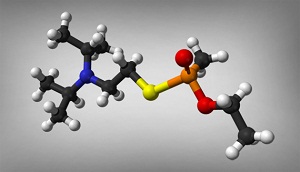Nerve Agents
 |
Nerve Agents are highly toxic substances. Because of their toxicity, these agents have been used as chemical warfare agents. GA (tabun), GB (sarin), GD (soman), and VX are all classified as nerve agents.
Service members may be at risk for nerve agent exposure if exposed to these agents during a combat or terrorist situation.
During the Gulf War, there was some concern that American service members may have been inadvertently exposed to small amounts of sarin and cyclosarin during a weapons demolitions mission that occurred in March 1991 in Khamisiyah, Iraq. Exposure levels to sarin and cyclosarin were very low and medical personnel in the area saw no evidence of health problems related to nerve agent exposure at the time. Current medical evidence indicates that such low levels of exposure are not likely to produce long-term health problems.
Research published in 2005 reported on the causes of death among Army veterans who served in the 1991 Gulf War. This study compared the causes of death for veterans who were in the Khamisiyah area and those who were outside the possible exposure area. Total death rates were the same for the two groups, and the two groups had equal rates of death from disease. The overall rates of death from cancer were the same in both groups. However, the rate of death from brain cancer was higher among Gulf War Veterans who were serving in the Khamisiyah area. The IOM report notes that neither sarin nor cyclosarin are known to cause cancer. However, research is ongoing to further explore this.
Health symptoms depend on the amount of exposure to a nerve agent. Symptoms of acute nerve agent exposure include:
- Runny nose
- Chest tightness
- Pinpoint Pupils
- Excessive salivation and sweating
- Confusion
- Gastrointestinal symptoms
- Muscle twitching
- In severe cases, seizures, paralysis, coma and death may occur.
Research on long term health effects is inconclusive. Individuals who are exposed to high levels of sarin (for example, levels that results in acute symptoms) may experience long term neurological side effects. These include headaches, fatigue, visual disturbances, memory difficulties, and symptoms of PTSD. At this time, there is insufficient evidence to conclude that individuals who are exposed to low levels of sarin (for example, levels that do not result in acute symptoms) will experience long term health effects.
Disclaimer
*Links will take you outside of the Department of Veterans Affairs web site. VA does not endorse and is not responsible for the content of the linked websites.



















